

Teacher Digital Learning Passport. National Geographic Society. National Geographic Educator Certification is a free professional development program that recognizes pre-K through 12 formal and informal educators committed to inspiring the next generation of explorers, conservationists, and changemakers.
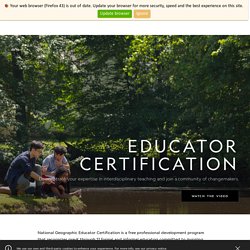
These educators are part of a powerful movement to make the world a better place by empowering students to be informed decision-makers equipped to solve meaningful challenges in their communities and beyond. Don’t just teach students about the world—teach them how to change it. Enrollment for our winter 2020 cohort is now available. Enroll Note: This course was primarily designed for educators in the U.S. and Canada who teach students in grades pre-K through 12, so it is grounded in education standards and cultural norms relevant to that context. Critique Protocol: Helping Students Produce High-Quality Work.
Student: Wait, should I clear out this?
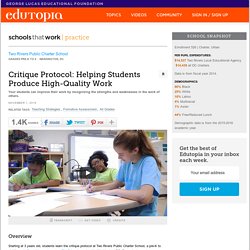
Jodi: I numbered the lines in your tribute poems. When somebody is giving you feedback, they can name the specific line number. Student: I like stanza one, because it has really strong figurative language. Detail. Problem melden Online The Future Classroom Scenarios course aims to introduce teachers, headteachers and ICT coordinators in schools to concepts, tools, and exchanges about the future classroom.
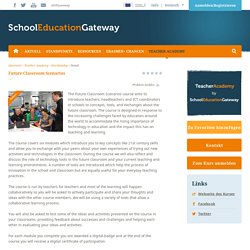
The course is designed in response to the increasing challenges faced by educators around the world to accommodate the rising importance of technology in education and the impact this has on teaching and learning. The course covers six modules which introduce you to key concepts like 21st century skills and allow you to exchange with your peers about your own experiences of trying out new activities and technologies in the classroom. During the course we will also reflect and discuss the role of technology tools in the future classroom and your current teaching and learning environments. Home - EUN Academy. Stages of Social Networking Experience. Every person, business, or organization who currently uses Social Networking had to start at the beginning to set up a user account.
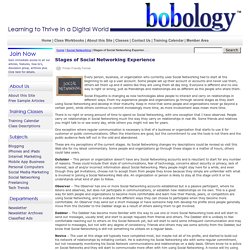
Some people set up their account or accounts and never use them, others set them up and it seems like they are using them all day long. Everyone is different and no one way is right or wrong, just as friendships and relationships are as different as the people who share them. 100 Incredibly Useful YouTube Channels for Teachers. YouTube has earned a reputation for featuring brain cell-slaughtering fare such as the truly abysmal Fred and playing host to the some of the most depressingly stupid comments this side of Yahoo!
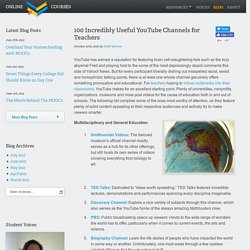
News. But for every participant liberally dishing out misspelled racist, sexist and homophobic talking points, there is at least one whose channel genuinely offers something provocative and educational. For teachers hoping to infuse multimedia into their classrooms, YouTube makes for an excellent starting point. A Problem-Solving Game For Teachers and Administrators. By Gayle Allen Earlier, I wrote about four activities teachers and school leaders can use to jump-start creative problem-solving in teams.
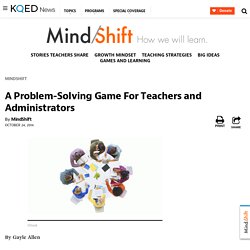
Given the increased pressure on educators to innovate, the goals for each activity were to build or deepen skills associated with that work. Readers expressed particular interest in one of these activities, so I wanted to do a deep dive and provide additional information. Action Research Projects. How to Integrate Tech When It Keeps Changing. Asking if technology enhances learning is like asking if dogs are playful.
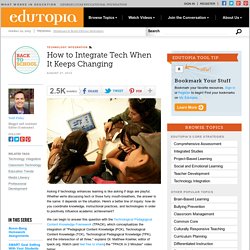
Whether we're discussing tech or those furry mouth-breathers, the answer is the same: it depends on the situation. Here's a better line of inquiry: how do you coordinate knowledge, instructional practices, and technologies in order to positively influence academic achievement? We can begin to answer this question with the Technological Pedagogical Content Knowledge Framework (TPACK), which conceptualizes the integration of "Pedagogical Content Knowledge (PCK), Technological Content Knowledge (TCK), Technological Pedagogical Knowledge (TPK), and the intersection of all three," explains Dr. Matthew Koehler, editor of tpack.org. Watch (and feel free to share) the "TPACK in 2 Minutes" video below: Sensible Technology Integration By 2015, 80 percent of people accessing the Internet will do so with mobile devices. 1.
Tech PD Modules goo.gl/jq3Yzq. Global Online Academy. A Learning Typology: 7 Ways We Come To Understand. A Learning Typology: 7 Ways We Come To Understand by Stewart Hase, Heutagogy of Community Practice This typology is an attempt to redefine how we think of learning in the 21st century context.
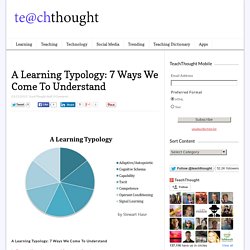
Current definitions of learning focus on performance rather than holistic growth, and on what the learner can do after a learning experience. Gagne is perhaps the most notable exception. General dictionary definitions of learning refer to learning as the acquisition of knowledge. We are much more able now to examine directly how people learn rather than indirectly by studying what techniques work, which tends to be anecdotal and qualitative. The typology described below concerns what is happening in the mind of the learner during the experience of learning. Each type of learning implies that different learning experiences can be designed to either help people learn or are aimed at people already operating at that level. The worthiness test is not meant to be applied. 1. 2. 3. Growth vs Fixed Mindset. List of Education & Teaching free online courses/MOOCs. Professional Development for Teachers.
Online PD - International Baccalaureate®